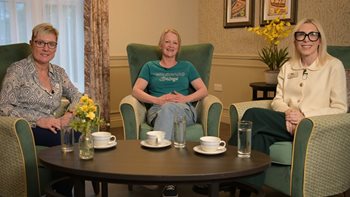Well-being of dementia care home residents in the spotlight
Company news
Jul 01, 2011
Leading nursing home provider Care UK is already known for providing high quality residential care for frail older people - independent inspectors have rated 96% of the homes as good or excellent- but managers wanted to find new ways of improving the quality of life for residents even further.
The results of the trials were impressive - residents in nine homes were more settled, enjoyed greater levels of independence and slept better.
The project started last summer when Care UK bosses put together a research team made up of the best dementia experts in their company, gave them a budget and told them to go away and think creatively. What came back was a proposal that blended training techniques from the stage and screen with a novel approach to interior design that might make even Laurence Llewelyn-Bowen look twice.
Although the project sounds a little unorthodox, the team responsible for devising the proposal has a strong clinical, nursing and care background so managers agreed to a nine-month research project in nine homes and one day centre in Surrey.
Before the trial started, independent observation was used to assess the well-being of residents and look at how the homes were performing in order to provide a benchmark against which to measure results.
Then the hard work began. The first task was to devise and deliver a dementia training course to every single person who worked in one of the nine homes including kitchen staff and laundry assistants. Even the Managing Director undertook the course.
But this wasn’t some boring old book or lecture based class. Instead, staff were given direct experience of the dramatic effect that dementia and frailty can have on the senses. The trainer, a Care UK employee with a background that encompasses nursing, managing care homes and drama, took colleagues through a whole day where nothing seemed to make sense. For example, special glasses blurred their vision, headphones delivered white noise, and gloves restricted the movement of fingers. Trainees found themselves being fed food that they could not see, drinking tea from a child’s plastic training beaker and being asked several questions in quick succession without enough time to think of replies.
The trainer used her theatrical background to bring the training to life by occasionally slipping into ‘character’. After each ‘task’ trainees discussed how it made them feel and what needs to be done differently.
The training is emotional, exhausting, eye opening and unforgettable. What it delivers is a powerful experience of how frustration and confusing situations, coupled with impaired senses, can make anyone angry or distressed. The result - care home staff who take more time to listen, who can empathise when someone is confused and know how to watch out for triggers that might lead to anger.
The next task for the research team was to look at the homes. Not the carpets or colours of the walls, but how the rooms are actually laid out. Creating something that residents would recognise from their own homes when they were much younger. This has included introducing fireplaces and mantelpieces into lounges so they more closely reflect a family home; setting dining tables in advance to give residents a sense that it is time for a meal; and the introduction of ‘retro’ fittings - such as old-style telephones or ornaments from the 1940s to 1960s - to stimulate memories and create a talking point.
A pair of wellies by the door to the garden, ribbons and sewing materials peeping out of a sideboard and an apron hanging on a hook in the hall all create a comforting sense of home.
For nine months, the research team made changes to the homes and trained over 450 staff in what dementia might feel like. Then they started work on evaluating the results. The researchers repeated their work to measure perceptions of the homes. They looked at the quality of the environment, how happy they personally would be to have a relative cared for within the home and the attitude of staff.
In addition, discrete observations to measure the well-being of residents were repeated to assess the level of residents’ engagement with other people and their mood.
The results were impressive - particularly as the homes were already providing care of a high standard before the project started. Researchers discovered that residents were 40 per cent happier at the end of the pilot, they were more alert, found it easier to relax, had greater levels of independence and interacted more with other people.
Incidents against members of staff, often prompted by frustration at not being able to make themselves understood, also dropped by 40 per cent and residents enjoyed greater mobility and better sleeping patterns.
A key member of the research project, Care UK’s head of service design Karen Morrison said: "Staff have eureka moments and it is wonderful to see. For example, with the experience of having constant white noise in their ears and distorted vision, my colleagues quickly learnt how a resident could have mistaken a trick of the light for a hallucination. We are getting powerful feedback on how staff are looking beyond what they can initially see - to really understand what might be troubling a resident. This is not only very beneficial for residents but also very rewarding for the staff who can see how they’ve made a difference by treating each person as an individual."
Care UK managers will take best practice from the trials and roll this out to other homes across the country. The environmental changes, like the homely room settings, will also be incorporated into refurbishments of other homes across the country. Care UK has plans to build at least 30 new homes over the next five years so the findings of this research project will help shape the staff training programme and the building design for those homes.
Encouraging staff to develop new and better ways of providing care and treatment is very much part of Care UK’s ethos. The company also delivers care at home for over 14,000 people, supports over 500 people with learning disabilities, runs eight hospitals and over 50 primary care facilities on behalf of the NHS and has many projects underway to help deliver better or more cost effective services to patients.


